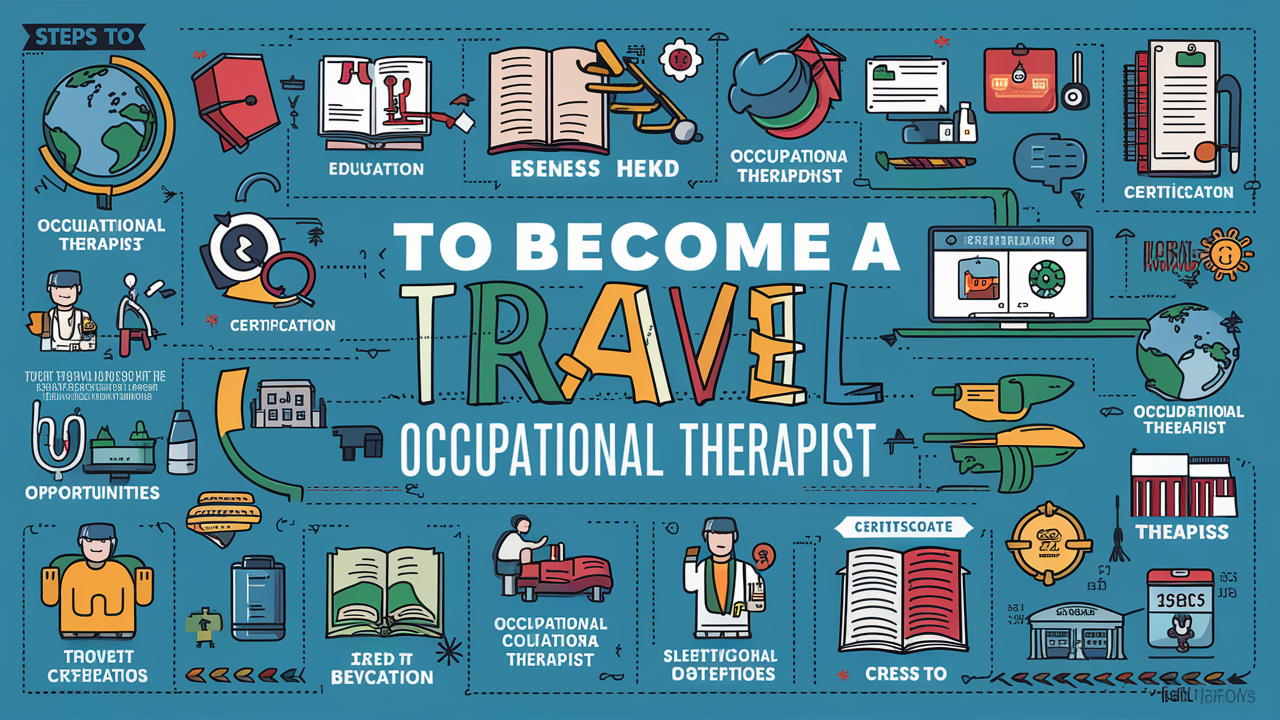How to Become a Travel Occupational Therapist: Education, Certification, and Job Opportunities
Travel occupational therapy is a dynamic and rewarding career path that offers the opportunity to explore diverse settings while making a meaningful impact on patients’ lives. As a travel occupational therapist, you’ll have the chance to work in various locations, from bustling urban hospitals to serene rural clinics, gaining invaluable experience and skills. This guide will walk you through the necessary steps to become a travel occupational therapist, including education, certification, and job opportunities.

Content
Education Requirements
Bachelor’s Degree
To start your journey toward becoming a travel occupational therapist, you must first obtain a bachelor’s degree. While there is no specific major required, degrees in health sciences, psychology, or biology are often recommended. During your undergraduate studies, focus on prerequisite courses such as anatomy, physiology, and psychology, which will prepare you for advanced occupational therapy coursework.
Master’s Degree in Occupational Therapy
After earning your bachelor’s degree, you must pursue a master’s degree in occupational therapy from an accredited program. Accreditation ensures that the program meets the standards set by the Accreditation Council for Occupational Therapy Education (ACOTE). During your master’s program, you’ll engage in key coursework that covers areas such as human anatomy, therapeutic techniques, and patient care. Clinical experience is also a critical component, allowing you to apply theoretical knowledge in real-world settings.
Certification and Licensing
National Board for Certification in Occupational Therapy (NBCOT) Exam
Once you have completed your master’s degree, the next step is to pass the NBCOT exam. This certification is crucial for practicing as an occupational therapist in the United States. To prepare for the exam, consider utilizing study guides, practice tests, and review courses. Passing the NBCOT exam demonstrates your competence and readiness to enter the field.
State Licensure
In addition to national certification, you must obtain a state license to practice as an occupational therapist. Each state has its own requirements and process for licensure, so it’s essential to research the specific requirements in the state(s) where you wish to work. Maintaining your licensure involves continuing education to stay updated with the latest practices and techniques in occupational therapy.
Clinical Experience
Gaining practical experience is vital for success as a travel occupational therapist. Internships and residencies provide hands-on training in various healthcare settings, such as hospitals, rehabilitation centers, and outpatient clinics. These experiences help you develop essential skills and build a professional network.
Specializations
Occupational therapy offers various specializations, such as pediatric therapy, geriatric therapy, and neurological rehabilitation. Specializing in a particular area can enhance your expertise and open up more job opportunities. Specializations can also make you more attractive to travel therapy agencies seeking candidates with specific skill sets.
Becoming a Travel Occupational Therapist

Travel Therapy Agencies
To embark on a career as a travel occupational therapist, consider partnering with reputable travel therapy agencies. These agencies play a crucial role in job placement, helping you find assignments that match your skills and preferences. Research agencies thoroughly, reading reviews and testimonials to ensure they have a positive reputation and offer competitive benefits.
Contract Work and Assignments
As a travel occupational therapist, you’ll typically work on a contract basis. Assignments can range from a few weeks to several months, depending on the facility’s needs. Before accepting a contract, carefully review the terms and conditions, including salary, benefits, and travel stipends. Familiarize yourself with the typical duration and locations of assignments to ensure they align with your career goals.
Job Opportunities and Career Growth
Job Market Overview
The demand for travel occupational therapists is strong, driven by factors such as an aging population and increased awareness of occupational therapy benefits. Geographic areas with high demand often offer attractive compensation packages to attract qualified professionals. Staying informed about the job market can help you identify regions and facilities with the greatest need for travel occupational therapists.
Career Advancement
Travel therapy offers numerous opportunities for career advancement. Working in diverse settings allows you to develop a broad skill set and gain exposure to different patient populations. This experience can enhance your resume and make you a competitive candidate for advanced roles, such as lead therapist or clinical supervisor.
Conclusion
Becoming a travel occupational therapist is a rewarding career choice that offers the chance to explore new places while making a positive impact on patients’ lives. By following the steps outlined in this guide, you can embark on a fulfilling journey in travel occupational therapy, gaining valuable experience and advancing your career. If you’re passionate about helping others and eager to embrace new challenges, consider pursuing a career as a travel occupational therapist today.












